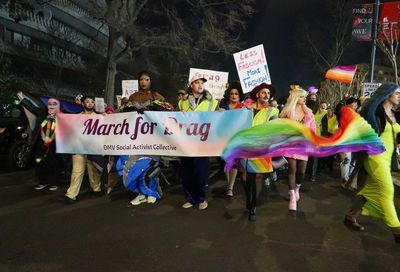News Analysis: When Is a (DOMA Litigation Cost) Cap Not a Cap?
On Monday, April 18, news broke that King & Spalding partner Paul Clement would be the lead outside counsel representing the House’s Bipartisan Legal Advisory Group in litigation challenging the constitutionality of Section 3 of the Defense of Marriage Act — the House Republican leadership’s response to the Department of Justice’s Feb. 23 decision not to defend Section 3 of DOMA. On April 19, the contract was made public and it was learned that a $500,000 “cap” was placed on King & Spalding’s representation — although the cap could be “raised by written agreement between the parties with the approval of the [House] Committee [on Administration].”
Although some on the left like The American Prospect‘s Gabriel Arana defended the $500,000 fee and said that others’ attacks on House Speaker John Boehner (R-Ohio) on “fiscal security” grounds were misplaced, others like Lane Hudson at The Huffington Post pushed back by dismissing the $500,000 figure as fantasy and concluding, “The Speaker of the House lies about the cost of this case.”
 Minority Leader Rep. Nancy Pelosi (D-Calif.) took a similar position, but asked Boehner questions rather than drawing conclusions. In a letter sent on April 20, Pelosi questioned several aspects of the decision, but two questions are key here:
Minority Leader Rep. Nancy Pelosi (D-Calif.) took a similar position, but asked Boehner questions rather than drawing conclusions. In a letter sent on April 20, Pelosi questioned several aspects of the decision, but two questions are key here:
- Was there a determination that $500,000 would be sufficient to pay for the complete legal representation in the 12 pending cases, and if so, who made that determination and how?
- Is it anticipated that King and Spalding will represent the House in all 12 pending DOMA cases from the trial stage through any and all appeals?
These questions are important to understanding the significance of King & Spalding’s work and the extent to which Boehner’s “cap” is or is not “sufficient” to complete the litigation, particularly in light of the number and complexity of the cases. Additionally, as Pelosi’s finial question above illustrates, the King & Spalding contract — despite some very restrictive terms as to what King & Spalding attorneys can do — is very vague as to what work it will perform.
In addition to the Windsor v. United States case in which King & Spalding attorney Paul Clement already has filed a motion on behalf of the BLAG seeking to intervene in the case, two appeals in the U.S. Court of Appeals for the First Circuit (Gill v. Office of Personnel Management and Massachusetts v. United States), a case at the trial court level in Connecticut (Pedersen v. Office of Personnel Management) and federal court employee Karen Golinski’s attempt in a federal court in California to get health benefits for her wife (Golinski v. Office of Personnel Management) are ongoing, there also are six other cases listed by the Department of Justice in a Feb. 25 memorandum sent by Assistant Attorney General Robert Weich to Boehner as being impacted by the DOJ DOMA decision.
Compare this long list of cases with the IRS 990 (pdf) filed for the period of April 23, 2009, through March 31, 2010, by the American Foundation for Equal Rights — the nonprofit organization funding the federal court challenge to Proposition 8. Michael Petrelis looked into the filing, as he does for many LGBT nonprofits, on April 20.
AFER reported paying lead attorney Ted Olson’s firm of Gibson, Dunn & Crutcher LLP a total of $1,691,714 for legal expenses related to the then-named Perry v. Schwarzenegger case (now, Perry v. Brown). Although the case included a grand presentation with a three-week trial and several expert witnesses, it is not uncommon to have such lengthy litigation as a part of constitutional challenges. A similar trial was, in fact, held later in 2010 in the Log Cabin Republicans v. United States challenge to the military’s “Don’t Ask, Don’t Tell” policy.
In sum, a portion of one case cost more than three times more money than Boehner, through House General Counsel Kelly Kircher, set as a “cap” in the undefined number of DOMA, Section 3, challenges that King & Spalding will be handling, all at different stages of litigation — including many still at the trial court level.
What’s more, according to an earlier Pelosi letter to Boehner, the decisions about the initial contract were made without consultation of the Democrats on either the BLAG or the House Committee on Administration.
In light of the ease and secrecy with which the initial contract was reached and, thus, could be altered, it would appear that not only is the King & Spalding $500,000 “cap” no cap at all but that it also is based on a number that was in no way intended to represent a good-faith estimate of the actual, final cost of defending Section 3 of DOMA against the multitude of challenges it faces in court.
[Photo: Then-House Speaker Nancy Pelosi (D-Calif.), speaking at a Victory Fund event in 2010. (Photo by Chris Geidner.)]
Support Metro Weekly’s Journalism
These are challenging times for news organizations. And yet it’s crucial we stay active and provide vital resources and information to both our local readers and the world. So won’t you please take a moment and consider supporting Metro Weekly with a membership? For as little as $5 a month, you can help ensure Metro Weekly magazine and MetroWeekly.com remain free, viable resources as we provide the best, most diverse, culturally-resonant LGBTQ coverage in both the D.C. region and around the world. Memberships come with exclusive perks and discounts, your own personal digital delivery of each week’s magazine (and an archive), access to our Member's Lounge when it launches this fall, and exclusive members-only items like Metro Weekly Membership Mugs and Tote Bags! Check out all our membership levels here and please join us today!




















